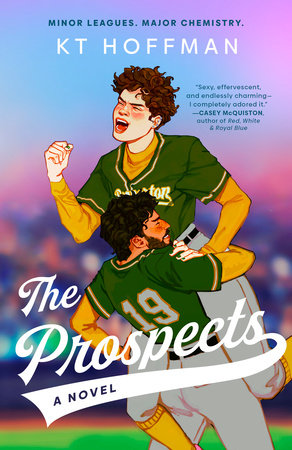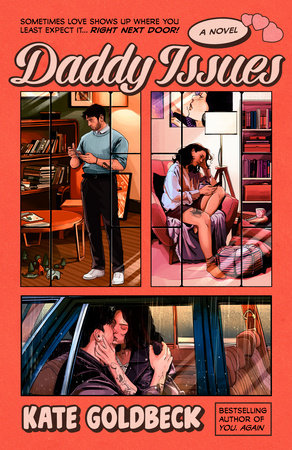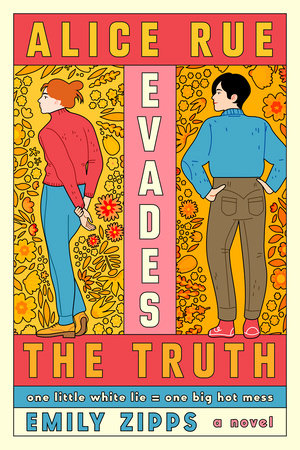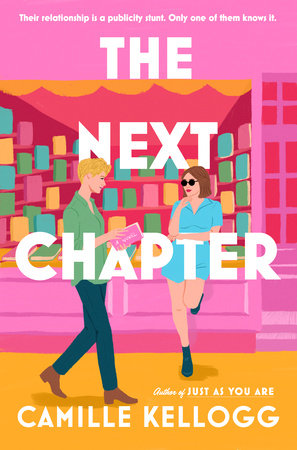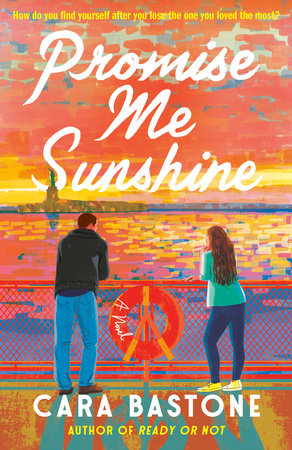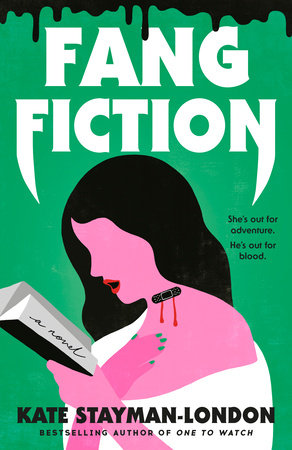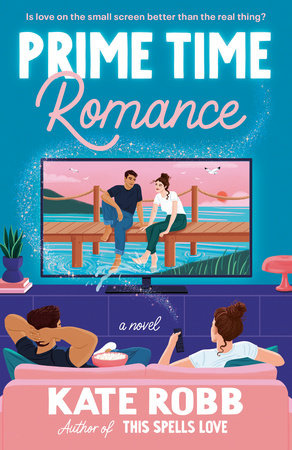Excerpt
The Prospects
1
AprilCurrent record: 0–0
Gene Ionescu has always loved every detail of baseball, but none quite so much as its near-complete indifference to the body. In few other sports can a five-foot, two-inch sprinter appear on the same roster as a six-foot, five-inch pitcher. Size—muscle, height, maybe a few extra inches of reach or long running legs—helps. But baseball also rewards the patient, the crafty, and, perhaps most of all, the optimistic.
It’s that hope, more than anything else, that makes Gene a good baseball player. He plays baseball because he is an optimist; he is an optimist because he has to be.
On April first, four days before a new season starts, in the most optimistic moment of the most optimistic sport, when every last thing feels possible, Gene sits on the floor of his apartment, wrestling with an Allen wrench.
Vince finds him like that, hunched over and cursing. “You’ve had five months of offseason to do this. Why the sudden burst of productivity?”
“Well, I meant to do it in November, but my brain finally decided to recognize a deadline today, and I’m trying to make the most of it,” Gene says. He gestures to the bookshelf he’s been working on for the last hour. “Except I can’t figure out why this screw doesn’t fit. What if I just throw the whole thing away and embrace minimalism?”
Vince drops onto Gene’s couch, picks up the IKEA instruction manual, and sets his feet on the dented, partially unpacked cardboard box Gene uses as an ottoman. A moment later, he jangles the bag of hardware in Gene’s direction. “Because you’re using the wrong screws. You need the short ones, and a Phillips-head,” he says.
Probably not the kind of assistance IKEA envisioned when its cartoon directions told Gene not to assemble heavy furniture alone, but it works.
Last spring, when he was assigned to start the season with the Beaverton Beavers—the Triple-A minor league team for the Portland Lumberjacks—an unfamiliar number texted him less than an hour after the rosters were announced.
This is Vince Altman. I play for Beaverton. Would love to have you over for coffee, get to know you!
“Love” had actually been a heart emoji, but what endeared Vince to Gene from the start, what surprised and impressed him, was the introduction. As if any self-respecting baseball player could fail to recognize the name of Portland’s former golden boy.
A day later, the Vince Altman told Gene over coffee in his kitchen that he had a husband—with whom he lived and about whom the entire team, and very nearly no one else, knew. He became the first, and thus far only, queer man currently in baseball to welcome Gene to their small, often lonely club.
A season and a small lifetime later, Gene rents the one-bedroom, gable-roofed attic of Vince’s house in the hills of Southwest Portland. If someone had told Gene when he signed his contract that former Cy Young–winning pitcher Vince Altman would become his best friend, that he would let Gene stay in his house for free—that he was gay-married, no less—Gene would never have believed them.
But, Cy Young Award and all, the guy can be a pain in the ass.
“So. You excited to play your boyfriend next week?” Vince asks.
Gene pushes the bookshelf off his lap and flops, perhaps a little more dramatically than the situation calls for, onto his back. “You can’t be mean to me on my birthday.”
“Like f*** I can’t.”
Gene already has to see Luis Estrada twenty-four times a season, which is twenty-four more times than he’d prefer. He doesn’t get why they have to talk about him, too. Because Luis Estrada is not Gene’s boyfriend, not even close. He’s the thorn in Gene’s side, the popcorn kernel stuck between his teeth, the crack in his ass—and still somehow the blandest man alive.
Every time Beaverton plays his team, Luis makes some absurd catch, always when Gene is at the plate. Luis never even reacts to it. Just tosses the ball back to the pitcher like nothing happened. Plus, Luis won last year’s minor league Gold Glove over Gene, then didn’t even bother showing up to the ceremony, and Gene has always been a rather impressive grudge-holder.
But before those twenty-four games, before the Gold Glove and the absurd catches and barely justified grudges, Luis and Gene shared a baseball diamond for one strange, sublime season of college ball. It was the abrupt end to their time as teammates that then begot the sharp-jointed discomfort that makes itself known between them now, every time their schedules collide.
Of course, Vince ignores all those details in favor of latching onto one offhand, year-old comment about Luis’s perfect hair that he can’t even prove Gene made.
(Gene stands by said comment. But still.)
“I would rather,” Gene starts; Vince groans, and Gene talks right over it, “wear the Beavers’ mascot costume to my ex-boyfriend’s wedding—”
“—than spend even one minute with Luis Estrada,” Vince finishes. He considers, then admits, “That was a pretty good one.”
It’s becoming something of a series. Other entries have included: I would rather clip your dogs’ toenails during an earthquake, I would rather ask the clubby to make the post-game spread vegetarian-friendly, and I would rather get stuck next to the bathroom on the roadie bus all the way to Albuquerque.
The point is, he’d rather open the season against basically any other team, any other opposing shortstop. But such is life, and such is Gene’s luck. They’ll play Luis twenty-four times, and Gene will avoid him as much as possible. It’s not like Luis Estrada has ever sought out friendly small talk anyway.
“All the more motivation to open the season with a win,” Gene says. “So, what did you get me for my birthday?”
“Oh, was that today?” Vince says, feigning surprise. “Shit, I didn’t get you anything.”
“Perfect! Then you can finish this shelf for me while I go raid your fridge.”
“You should stay up here,” Vince says, nonchalant only in the most practiced sense of the word.
Gene narrows his eyes. “What’s happening downstairs?”
“Nothing,” Vince lies.
As if on cue, another set of footsteps comes up the stairs separating Gene’s apartment from the rest of the house. Jack—taller than his already-tall husband, a certified bear, and handsome in the most comforting of ways—pops his head into Gene’s apartment.
He signs, “Hello, Gene,” the same as he does every time they see each other. Jack has a hearing aid on each side, but he doesn’t always wear them, and prefers signing regardless. To sign Gene’s name, he forms each of his hands into the letter G and swipes them in two arcs at the corners of his mouth. A G and a smile, a sign name he gave Gene early after meeting him.
“Hey, Jack,” Gene signs back—the letter J, his pinky tracing the shape of the letter in the air in a curl around his chin, an alteration of the sign for “beard,” like the auburn one Jack has. “What’s happening downstairs?”
Gene says the second part out loud as he signs it, careful to face Jack when he does. Jack knows Gene well enough to lip-read okay when Gene speaks, but he’s explained that it’s harder than signing. So Gene practices his signing with Vince sometimes, on the bus and in their hotel room. Gene is still nowhere near fluent—it’s easier to understand Jack’s hands than to form the right words with his own—but he’s amazed how much easier it comes to him now than it did a year ago.
Jack raises his eyebrows. “Did you tell him?” he signs at Vince, his hands lovingly accusatory.
“I said nothing,” Vince answers.
“We’re done setting up,” Jack signs, with a hand wave and a shoulder shrug that, in concert, sort of imply Oh well, what’re you going to do, my husband can’t keep a secret to save his life.
“We?” Gene asks.
Jack raises his eyebrows. Aloud, he says, “Did he really not tell you about the party?”
“You guys threw me a party?”
Vince throws up his hands. “I told you I didn’t tell him!” It comes out half-laugh, half-exasperation. “And you gave me the hard job. You know I can’t keep a secret.”
“But you also can’t make cake,” Jack counters.
Gene drags himself up off the ground. “There’s cake?”
He always means to make himself one, but his birthday gets consumed by anticipation of and preparation for baseball season’s onset every year—all the things he spent the offseason delaying—and he never ends up with enough time. He can’t remember the last birthday he even managed a box mix.
“Don’t get too excited,” Vince says. “It’s just cheesecake.”
He might wink at Jack when he says this, but Gene can’t be entirely sure. Vince ushers Gene down the hall, toward the stairwell. The wide-planked, age-smoothed hardwoods groan underfoot, the rhythm familiar and comfortable.


